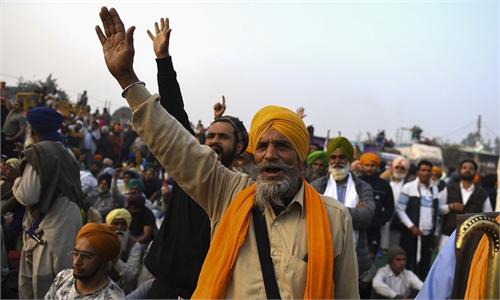COMMENTS / EXPERT ASSESSMENT
Biz Quick Take: Don’t put too much onus on India, for it may go awry

Illustration: Tang Tengfei/GT
Some Western organizations are again rooting for India's economy, predicting it will overtake Germany and Japan to become the world's third largest economy by 2030. The IHS Markit said in a report last week that India's nominal GDP, now measured at $2.7 trillion, may surge to $8.4 trillion within nine years.The IHS forecast was broadly reported and promoted by the media outlets in the US, the UK and Australia, as these countries always seek any piece of news that could help them cast a shadow over China. But there remain enormous uncertainties surrounding the prediction, if India's largely inferior infrastructure and underperforming manufacturing, as well as the laborers' poor educational levels, are taken into account.
The challenge seems insurmountable in the coming decade for India, if New Delhi is bent on restricting or discriminating investment from its giant neighbor - China. To put it another way, the seriously frayed relations between the two nations, following the deadly Galwan Valley border clash on June 15, 2020, will continue to negatively impact business cooperation between the two neighboring countries.
India's economy has now basically recovered from the ebbs of the pandemic in 2020 when the GDP plunged about 10 percent from 2019 levels, but it still remains volatile and not much better than pre-Covid19 levels. The world's sixth largest economy, behind the US, China, Japan, Germany and the UK, is reportedly at 35.8 trillion rupee now, compared to 33.1 trillion rupee a year ago, and 35.7 trillion rupee recorded for 2019. To break up, manufacturing, capital investments, and consumption of durables are all below their pre-pandemic levels.
Prime Minister Narendra Modi has always articulated lofty plans for India, but it is hard for them to be translated into real change on the ground.
Earlier, Modi's proposed new corporate tax codes were fiercely opposed by Indian companies. The government's public finance has been overly stretched. New Delhi, which is mostly protectionist and operates some of the highest trade tariffs on imports in the world, has turned its back on RCEP at the last minute, fearing competition from foreign companies particularly from China. Indian farmers, who remain furious over Modi's controversial agricultural reforming laws, launched nationwide protests and street sit-ins against the national government in 2021.
After the Galwan border clash, New Delhi announced harsh restrictions on investment from China alleging national security concerns. It banned Chinese enterprises from participating in the government tenders. New Delhi's highly discriminative policy immediately poured cold water on economic cooperation between the two countries, and at a result, up to $8 billion Chinese investment plans were cancelled.
Despite needing to attract foreign investment to boost its economy, India lost voluminous FDI from China, as Chinese companies, like Tencent and Alibaba, started to transfer their businesses to Southeast Asia or Middle East markets.
In contrast, China's economic growth has been driven by some of the world's strongest investment drives, which in turn made possible both an infrastructure revolution in the country as well as mighty manufacturing muscle that has been the envy of the world. By restricting Chinese investment, Chinese apps and Chinese technology, New Delhi is turning its back to a difficult-to-find opportunity to change its fortune.
The Indian economy is heavily dependent on domestic consumption and exports. As a majority of Indian workers feel their budgets stretched, with many losing their jobs amid three waves of the coronavirus, such as the latest assault of the highly infective Omicron variant, their spending power is dwindling. And, overseas market appetite for Indian goods has dropped too.
From the perspective of geo-economics, it's utterly silly for New Delhi not to nurture a good relationship with China, whose economy is nearly six times that of India and is widely recognized as the single and most powerful engine of the world's economic growth. A souring relationship with China will prove to be the most distressful thing for India in the coming months, as China is determined to assist all its friendly neighbors to vigorously develop their economies.

